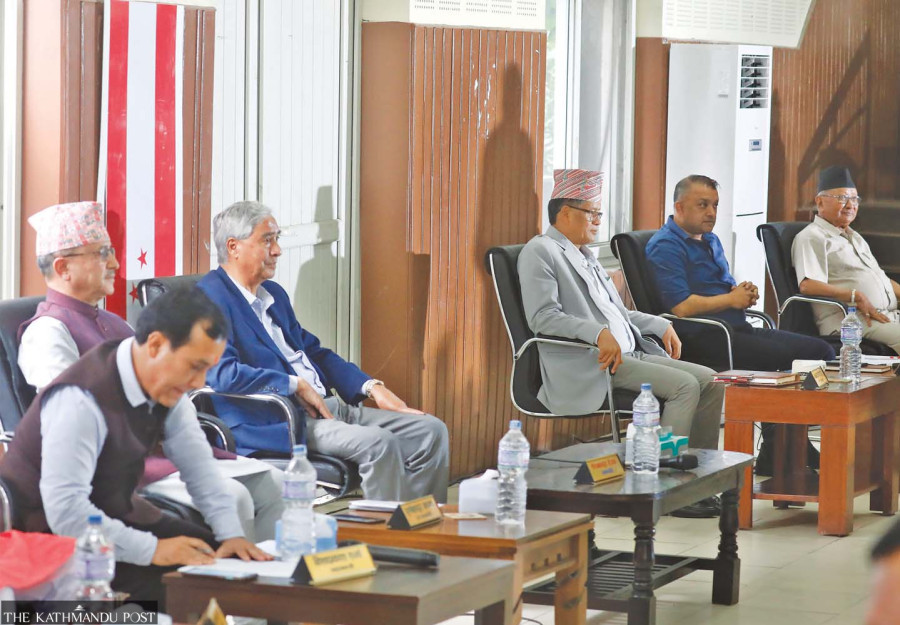National
Congress top leaders against prosecution in ‘non-cruel’ murder
Party takes a stance against demands of conflict victims that there must be no amnesty for serious rights violations.
Binod Ghimire
Office bearers of the ruling Nepali Congress, the largest parliamentary party, have concluded that there can be no changes in the categorisation of the insurgency-era human rights violations listed in the bill to amend the Enforced Disappearances Enquiry, Truth and Reconciliation Commission Act.
A meeting of the top leaders chaired by President Sher Bahadur Deuba decided that prosecution would be pursued in cases of serious violations of human rights, while reconciliation would be the priority for other acts of rights violations.
This pits the Congress party, which is rigid about not including murder as a serious rights violation, against conflict victims and human rights defenders who are adamant that there should be no amnesty in cases of serious rights violations in the name of transitional justice.
“It is natural for people to be killed in an armed conflict. The killings of the people from warring parties cannot be termed serious violations. Only cases of cruel murder are non -amnestiable,” Min Bishwakarma, chief of the Congress publicity department, told the Post. “The meeting of the office bearers directed the party chief whip to make the same demand accordingly while finalising the bill.”
A sub-panel under the Law and Human Rights Committee of the House is giving final touches to the controversial bill that was registered in Parliament in March.
The bill has listed ‘cruel murder’ or murder after torture, rape, enforced disappearances, and inhuman and cruel torture as serious rights violations. But ‘murder’ is just a human rights violation, therefore amnestiable. As many as 17,000 people lost their lives at the hands of security forces and then Maoist fighters.
The victims and human rights defenders say the bill has a loophole to list all murders as “not cruel”, thereby making them eligible for amnesty. It is unclear how the murders are differentiated as cruel and non-cruel. “A murder is a murder. How can murders be differentiated as ‘cruel’ and ‘normal’?” Maina Karki, a former chair of the Conflict Victims Common Platform, told the Post.
Karki, who is also a Congress lawmaker, differs with the decision of the party’s office bearers. She said a group of Congress lawmakers including her have asked chief whip Ramesh Lekhak to make sure the bill addresses the international standards of transitional justice and the 2015 Supreme Court verdict. Eight years back, the court had objected to several amnesty provisions in the Act and instructed the government to categorise amnestiable and non-amnestisble cases of rights violations.
According to the victims, even though the amendment bill has several progressive provisions like permitting an appeal in an insurgency-era case decided by a special court at the Supreme Court, there are several other arrangements that ultimately benefit the perpetrators.
They want an extension of the statute of limitations, a dedicated unit to investigate serious violations of human rights and removal of the attorney general’s prerogative to determine whether a case should be prosecuted or not. Similarly, they are in favour of giving the Judicial Council the authority to pick judges for the Special Court.
They are also sceptical about a provision in the bill that gives the transitional justice commissions just two years to complete their jobs. There are over 66,000 complaints in two transitional justice commissions combined.
Congress leaders say they are negotiating with all the parties to finalise the bill and put it to a vote at the earliest. The sub-panel is narrowing down 27 amendments in the bill.
“Our discussion is heading in a positive direction. Hopefully we can find a meeting point within the given deadline,” the Congress deputy general secretary Jeevan Pariyar, who also is a member of the sub-panel, told the Post. The sub-panel has a week to finalise the bill.
The government has extended the terms of the Commission of Investigation on Enforced Disappeared Persons and the Truth and Reconciliation Commissions until mid-January.




 18.12°C Kathmandu
18.12°C Kathmandu














